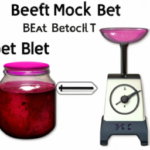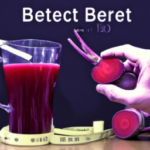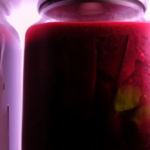Juice Tips and Tricks
How Long Does Beet Juice Last In The Fridge

Beet juice has gained popularity among health-conscious individuals for its rich content of vitamins, minerals, and antioxidants. It is praised for its various health benefits, such as improving digestion and boosting physical performance. If you’re wondering about the shelf life of beet juice in the fridge, you’re not alone.
As someone who has been drinking beet juice for quite some time, I can attest that the shelf life of beet juice can vary depending on how it’s stored and prepared.
So, how long does beet juice last in the fridge? The answer is, it depends. Generally, freshly squeezed beet juice can last up to 3-5 days in the fridge if stored properly. However, if you’ve purchased pre-made beet juice from a store, it may last longer due to the addition of preservatives.
Regardless of whether you’re making your own beet juice or buying it from a store, it’s essential to know how to store it correctly to ensure that it stays fresh and safe to drink.
Key Takeaways
- Freshly squeezed beet juice can last up to 3-5 days in the fridge if stored properly.
- Pre-made beet juice from a store may last longer due to preservatives.
- Proper storage techniques are essential to extend the shelf life of beet juice.
- Beet juice should be stored in a clean, airtight container in the refrigerator.
The Shelf Life of Beet Juice
Beet juice’s shelf life can vary depending on how it’s stored, but generally, it’ll last in the fridge for up to five days. Proper preservation techniques are essential to extend its shelf life. To maximize the beet juice fridge shelf life, it’s important to store it in an airtight container to prevent oxidation and loss of nutrients. Additionally, keeping the juice in the coldest part of the fridge can help slow down the growth of bacteria and prolong its freshness. Freezing the juice is also an option if you need to extend its shelf life beyond the standard five days.
Firstly, it’s important to store beet juice in a clean, airtight container. This will prevent bacteria from entering and spoiling the juice.
Secondly, the temperature at which the juice is stored plays a crucial role in determining its shelf life. When beet juice is stored at room temperature, it will spoil much faster than if it’s kept in the fridge. This is because higher temperatures promote bacterial growth, leading to the juice’s spoilage.
Therefore, it’s recommended to store beet juice in the refrigerator to maintain its freshness and extend its shelf life.
Now that we know how long beet juice lasts in the fridge and the factors that impact its shelf life, let’s move on to some tips for storing beet juice.
Storage Tips for Beet Juice
To keep your fresh beet juice at its best, it’s recommended to store it in airtight containers in the refrigerator. Proper storage is essential to maintain the quality of the juice and ensure it doesn’t spoil quickly. Glass containers are preferable to plastic as they are non-reactive and prevent the juice from absorbing any unwanted flavors or chemicals.
Here’s a comparison table of glass vs plastic juice containers:
| Glass Containers | Plastic Containers |
|---|---|
| Non-reactive | Reactive |
| Durable | Prone to scratches and cracks |
| Easy to clean | Retains odor and flavor |
Interestingly, a study found that beet juice stored in airtight containers can retain up to 85% of its antioxidant activity for up to 72 hours. This means that if you store your beet juice correctly, you can still enjoy its health benefits for up to three days. However, to make your beet juice last longer, there are additional steps you can take.
How to Make Beet Juice Last Longer
If you want your delicious and nutritious beet juice to stay fresh and flavorful for a longer period, you should try some of these simple tricks.
First, make sure to store your beet juice in an airtight container. This helps to prevent any exposure to air, which can cause oxidation and spoilage. Additionally, glass containers are the best option because they don’t contain any harmful chemicals or toxins that can affect the quality of the juice.
Another way to preserve beet juice is by adding a natural preservative like lemon juice or apple cider vinegar. These ingredients not only help to extend the shelf life of the juice but also enhance its flavor.
You can also freeze the beet juice in an ice cube tray and use it later in your smoothies or juices. Lastly, remember to keep the beet juice refrigerated at all times and consume it within 3-4 days.
To move on to the next section about different ways to use beet juice, let me tell you that beet juice can be a versatile ingredient that can be used in a variety of recipes, including smoothies, soups, and even desserts.
Different Ways to Use Beet Juice
One way you can incorporate this vibrant and nutritious ingredient into your diet is by adding a splash of beet juice to your morning smoothie or post-workout drink. Beet juice is a great addition to any smoothie recipe, as it adds a unique earthy flavor and a vibrant red color. It also contains enough nitrates to boost endurance and improve blood flow, making it a great choice for anyone who wants to increase their physical performance.
Another way to use beet juice is by incorporating it into your favorite salad dressings or marinades. You can mix it with olive oil, lemon juice, and honey to make a delicious and healthy dressing that complements any salad.
Additionally, drinking beet juice before your workout is the best time to drink it, as it helps increase your endurance and improve your performance. By adding beet juice to your diet, you can enjoy its many benefits and improve your overall health and wellbeing.
Now, let’s explore the health benefits of beet juice.
The Health Benefits of Beet Juice
I want to talk about the health benefits of beet juice. First off, it’s a great source of essential nutrients like vitamins A, C, and K, as well as minerals like iron and potassium.
Additionally, beet juice has been shown to improve athletic performance by increasing oxygen uptake and reducing muscle fatigue.
Lastly, it can help lower blood pressure due to its high concentration of nitrates, which help dilate blood vessels.
Rich in Nutrients
Packed with vitamins and minerals, beet juice is a great way to boost your nutrient intake. Here are four key nutrients found in beet juice:
-
Folate: Beet juice is a great source of folate, a B-vitamin that’s important for cell growth and development.
-
Potassium: Beet juice is a good source of potassium, a mineral that’s essential for maintaining healthy blood pressure.
-
Vitamin C: Beet juice contains vitamin C, an antioxidant that’s important for immune function and skin health.
-
Iron: Beet juice is a good source of iron, a mineral that’s essential for the production of red blood cells.
Incorporating beet juice into your diet is easy. You can drink it plain or mix it with other fruits and vegetables to create delicious and nutritious smoothies.
In the next section, we’ll discuss how beet juice can help boost athletic performance.
Boosts Athletic Performance
To enhance your athletic performance, you’ll love how beet juice can give you a natural boost of energy and endurance, making you feel like a champion on the field or at the gym.
Beet juice is known for its pre-workout benefits as it contains nitrates that convert into nitric oxide, which helps to improve blood flow and oxygenation to your muscles. This means that your muscles can work more efficiently, allowing you to perform better and for longer periods of time.
Furthermore, beet juice also has post-workout benefits. It contains antioxidants that help to reduce inflammation and soreness in your muscles, allowing for faster recovery times. This helps you to get back to your training routine quickly and prepare for your next workout.
By regularly incorporating beet juice into your diet, you can experience the full benefits of its natural performance-enhancing properties.
In addition to these athletic benefits, beet juice also helps to lower blood pressure, which we’ll discuss in the next section.
Helps Lower Blood Pressure
Lowering blood pressure is essential for a healthy heart, and with the help of beet juice, you can naturally manage your blood pressure levels. Beet juice contains nitrates, which are converted into nitric oxide in the body. Nitric oxide helps to relax blood vessels, allowing blood to flow more easily and reducing the pressure on the arterial walls.
This makes beet juice a great natural remedy for managing blood pressure levels. Not only does beet juice help with blood pressure, but it can also help to lower cholesterol. Studies have shown that drinking beet juice can lead to a reduction in LDL cholesterol levels, which is the ‘bad’ cholesterol that can contribute to heart disease.
Adding beet juice to your diet can be a simple and effective way to improve your heart health. However, it’s important to note that drinking too much beet juice can have potential side effects, which we’ll discuss in the next section.
Potential Side Effects of Drinking Beet Juice
I wanted to discuss the potential side effects of drinking beet juice. In my experience, I’ve noticed three common side effects:
- Stomach upset may occur due to the high fiber content in beets.
- Changes in urine color are caused by the pigments in beets.
- Beet juice can interact with certain medications, such as blood thinners, so it’s important to consult with a healthcare provider before drinking beet juice regularly.
Remember to give your body time to adjust to drinking beet juice and start with small amounts to see how your body reacts. If you experience any discomfort or unusual symptoms, it’s best to stop drinking beet juice and speak with a healthcare provider.
Stomach Upset
Hey, if you’re feeling a bit queasy after drinking that beet juice, don’t worry, it happens to some people. While beet juice is a healthy beverage, it can cause stomach upset in some individuals.
Fortunately, there are a few natural remedies that can help reduce discomfort. Here are some tips that might help:
- Drink plenty of water to help flush out your system.
- Avoid spicy or greasy foods that might aggravate your stomach.
- Consider taking a digestive enzyme supplement to help break down the nutrients in the beet juice.
Remember that everyone’s body is different, so what works for one person may not work for another. If you continue to experience stomach upset after drinking beet juice, it may be a good idea to talk to your doctor.
As you may have noticed, drinking beet juice can also cause changes in urine color. But don’t worry, this is a completely normal and harmless side effect. In fact, it’s actually a sign that your body is processing the nutrients in the juice!
So, if you’re concerned about the color of your urine, just remember that it’s nothing to worry about.
Changes in Urine Color
Although stomach upset is a common side effect of drinking beet juice, it’s not the only thing you should be aware of. Another possible side effect that you may encounter is changes in urine color.
This is because beets contain a pigment called betalain, which can cause your urine to turn pink or red. Some people may find this side effect alarming, but it’s usually harmless and will go away on its own after a few days.
However, if you experience other symptoms such as pain or difficulty urinating, it’s important to seek medical attention. Possible discussion ideas for ‘changes in urine color’ include the health implications of this side effect and how frequently it occurs among people who drink beet juice.
Moving forward, it’s important to note that beet juice can interact with certain medications. Therefore, if you’re currently taking any medication, it’s best to consult with your doctor before drinking beet juice.
Interactions with Medications
It’s important to note that beet juice can interact with certain medications, so it’s best to consult with your doctor before consuming it.
Beet juice contains high levels of nitrates, which can lower blood pressure. Therefore, individuals taking medications for high blood pressure, such as ACE inhibitors, should be cautious when consuming beet juice.
Additionally, individuals taking medications for erectile dysfunction, such as sildenafil (Viagra), should also avoid consuming beet juice, as the combination can lead to dangerously low blood pressure.
There are also potential contraindications for individuals taking blood thinners, such as warfarin. Beet juice contains high levels of vitamin K, which can interfere with the effectiveness of these medications.
It’s important to discuss any potential interactions with your doctor before incorporating beet juice into your diet. With proper guidance, beet juice can be a healthy addition to your daily routine.
How to Incorporate Beet Juice into Your Diet
Adding beet juice to your daily routine can be a tasty and nutritious way to improve your overall health. There are many easy ways to incorporate it into your diet. Here are some beet juice recipes that you can try out:
- Beet and Carrot Juice: Add equal parts of beets and carrots into a juicer, and enjoy a refreshing and flavorful drink that’s packed with vitamins and minerals.
- Beet and Apple Juice: Mix one large beet with two apples, and add a slice of ginger for a zesty and invigorating drink.
- Beet Juice Shots: If you prefer a quick and easy way to consume beet juice, try taking a shot of pure beet juice in the morning. This is a great way to boost your energy levels and improve your digestion.
In addition to its delicious flavor, beet juice offers many health benefits. It can improve your blood pressure, boost your immune system, and enhance your athletic performance. However, there are also other uses for beet juice. You can use it as a natural food coloring or add it to soups and stews for a rich and savory flavor.
Other Uses for Beet Juice
One surprising use for beet juice is as a natural food coloring. With its deep red color, beet juice can add a vibrant and healthy hue to baked goods and other dishes. In fact, many professional bakers and chefs have started using beet juice as a natural alternative to chemical food dyes. Not only is beet juice more natural, but it also adds a subtle earthy flavor to the dish.
If you’re interested in using beet juice as a natural food coloring, here are a few recipes to try out:
| Dish | Amount of Beet Juice |
|---|---|
| Red Velvet Cupcakes | 1/4 cup |
| Beet Hummus | 2 tbsp |
| Pink Lemonade | 1/2 cup |
Another surprising use for beet juice is in cocktails. With its sweet, earthy flavor, beet juice can add a unique twist to classic cocktails like margaritas and martinis. It also pairs well with other fruits and herbs, like ginger and berries, for a refreshing and delicious drink.
If you’re looking for some beet juice cocktail recipes, here are a few to try out:
| Cocktail | Ingredients |
|---|---|
| Beet Margarita | Tequila, lime juice, beet juice, agave syrup, salt |
| Beet Martini | Vodka, beet juice, lemon juice, honey syrup |
| Beet and Berry Smash | Gin, beet juice, blackberries, mint, lime juice, simple syrup |
Experimenting with beet juice in both baking and cocktails can open up a whole new world of flavors and possibilities. Give it a try and see how it can elevate your dishes and drinks to the next level.
Frequently Asked Questions
Can you freeze beet juice?
Yes, you can freeze beet juice. To ensure juice preservation and flavor preservation, use an airtight container and leave an inch of space at the top for expansion. Thaw in the fridge and consume within 24-48 hours for best quality.
Is it safe to drink expired beet juice?
Drinking expired beet juice can pose health risks, including food poisoning and bacterial infections. To enjoy the full beet juice benefits, it’s important to consume it within its shelf life and avoid drinking expired juice.
Is it necessary to refrigerate beet juice?
I refrigerate beet juice for optimal freshness and benefits. It’s a perishable food item that can spoil quickly if left at room temperature. Plus, chilled beet juice is refreshing and great for incorporating in recipes.
How can you tell if beet juice has gone bad?
When beet juice goes bad, it can smell like spoiled fruit or vinegar. However, expired beet juice can still be used for baking or as a natural dye. Consuming fresh beet juice can provide benefits such as improved digestion and lowered blood pressure.
Can beet juice be mixed with other juices?
I enjoy experimenting with beet juice recipes, as mixing it with other ingredients can enhance its benefits. However, it’s important to choose complementary flavors and avoid overpowering the delicate taste of the beets.
Conclusion
So there you have it, folks – the shelf life of beet juice is around 3-4 days when stored properly in the fridge. To make it last longer, try adding some lemon juice or apple cider vinegar to prevent spoilage. And don’t forget to use the juice in a variety of ways, from smoothies to salad dressings to marinades.
Now, some may argue that the potential side effects of drinking beet juice, such as stomach discomfort and changes in urine color, outweigh the benefits. While these side effects’re possible, they’re generally mild and temporary, and can be avoided by starting with a small amount of juice and gradually increasing the dosage.
Plus, the numerous health benefits of beet juice, including improved athletic performance, lower blood pressure, and better digestion, make it a valuable addition to any diet. So go ahead and give beet juice a try – your body’ll thank you!
Susannah expertise lies in researching and compiling evidence-based content on juicing, nutrition, and overall health. She is committed to ensuring that The Juicery World offers accurate, up-to-date, and trustworthy information to empower readers to take control of their health. Susannah’s goal is to inspire individuals to embrace juicing as a way to nourish their bodies and live their best lives.
Juice Tips and Tricks
How to Make Aloe Vera Juice Taste Better

Tired of the strong flavor of aloe vera juice? No problem, we’ve got the answer for you.
In this article, we’ll share some tips and tricks to make your aloe vera juice taste better. We have tried and tested various methods to enhance the flavor without compromising the health benefits.
From choosing the right juice to adding natural sweeteners and infusing with fruits and herbs, we’ve got all the information you need to transform your aloe vera juice into a delightful and refreshing beverage.
Let’s dive in!
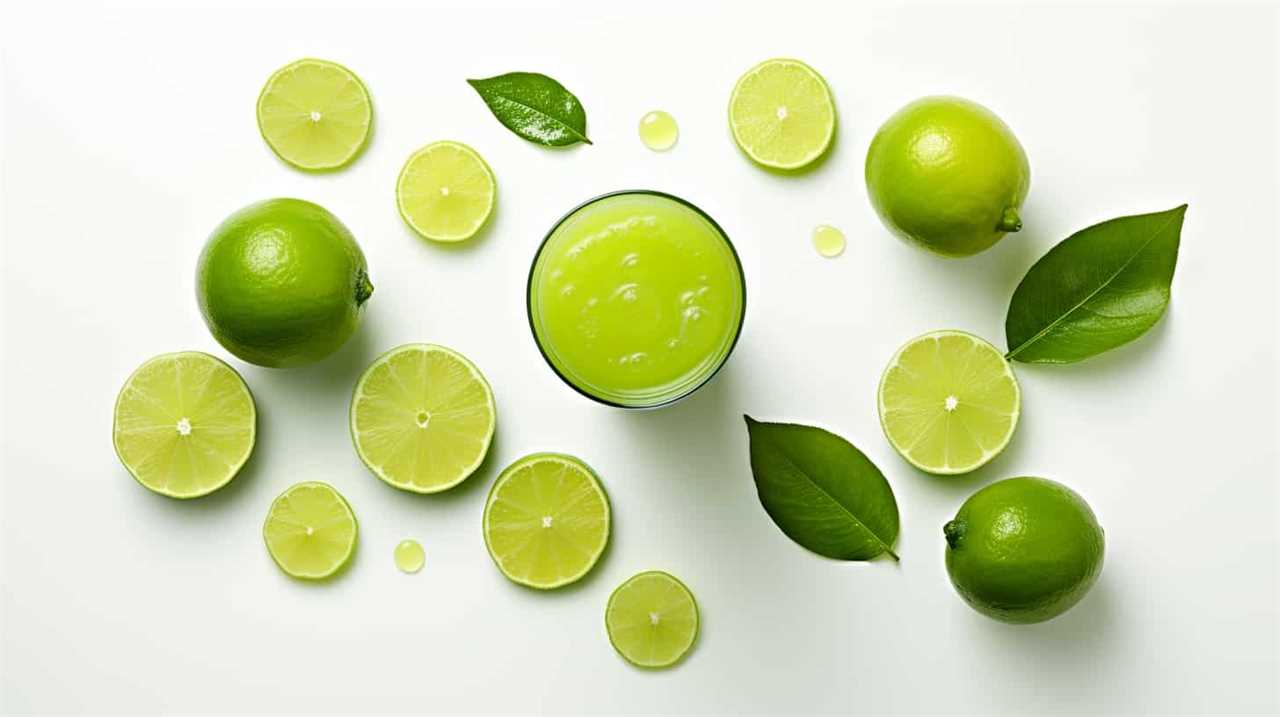
Key Takeaways
- Choose a reputable brand of aloe vera juice that prioritizes quality and uses organic, pure aloe vera.
- Avoid brands that contain added sugars or artificial ingredients.
- Use natural sweeteners like honey, agave syrup, or stevia to enhance the taste of aloe vera juice.
- Experiment with adding fruits, herbs, and other juices to create unique flavor combinations and enhance the health benefits of aloe vera juice.
Choosing the Right Aloe Vera Juice
We can enhance our experience with aloe vera juice by selecting the right brand and type for our preferences. When it comes to finding a reputable brand, it’s important to do some research and read reviews from other consumers. Look for brands that prioritize quality and use organic, pure aloe vera without any added sugars or artificial ingredients. Understanding the health benefits of aloe vera juice is also crucial in making the right choice. Aloe vera is known for its soothing properties, aiding digestion, promoting skin health, and boosting the immune system. By choosing a high-quality brand, we can ensure that we’re getting the maximum benefits from our aloe vera juice.
Now that we know how to choose the right brand, let’s move on to the next step of adding natural sweeteners.
Adding Natural Sweeteners
To enhance the flavor of our aloe vera juice, we can add natural sweeteners such as honey or agave syrup. Using alternative sweeteners not only adds sweetness but also brings unique flavors to the juice. Here are some options to consider:
- Stevia: A natural sweetener derived from the Stevia plant, it’s a zero-calorie alternative to sugar.
- Maple Syrup: This natural sweetener adds a rich and earthy flavor to the aloe vera juice.
- Dates: Pureed dates can be used to sweeten the juice while also providing essential nutrients like fiber.
In addition to using alternative sweeteners, we can enhance the flavor of aloe vera juice by adding spices and extracts. Cinnamon, ginger, or vanilla extract can add warmth and depth to the taste. By experimenting with different combinations of these natural sweeteners, spices, and extracts, we can create a flavor profile that suits our preferences.

Now, let’s move on to the next section and learn how to infuse aloe vera juice with fruits and herbs to further enhance its taste.
Infusing With Fruits and Herbs
As we explore ways to make our aloe vera juice taste better, one option to consider is infusing it with fruits and herbs. Creating unique aloe vera blends by adding fruits and herbs not only enhances the flavor but also adds a touch of freshness and complexity to the juice. For example, combining aloe vera juice with lemon, mint, or berries can create a refreshing drink that’s both delicious and packed with additional nutrients. It’s similar to the ease of making lemonade with bottled juice—quick, convenient, and customizable to suit your preferences. By experimenting with different fruit and herb combinations, you can elevate your aloe vera juice experience while still reaping its health benefits.
Fruits like strawberries, pineapple, or citrus can add a burst of sweetness, while herbs like mint, basil, or ginger can provide a subtle yet refreshing twist. Exploring the benefits of herbal infusions can also be beneficial for our health. For example, adding a few sprigs of lavender can promote relaxation and reduce stress. Additionally, infusing aloe vera juice with rosemary can aid digestion and boost the immune system.
Blending With Other Juices
Let’s try mixing aloe vera juice with different fruit juices to create delicious and refreshing blends. Blending aloe vera juice with other fruits not only enhances its taste but also adds nutritional benefits to your drink. Here are three fruit juices that you can mix with aloe vera juice:

- Orange juice: Combining aloe vera juice with orange juice not only adds a tangy flavor but also boosts your intake of vitamin C, which is essential for a strong immune system.
- Pineapple juice: Mixing aloe vera juice with pineapple juice creates a tropical blend that isn’t only refreshing but also helps in digestion. Pineapple contains bromelain, an enzyme that aids in breaking down proteins and promoting better digestion.
- Watermelon juice: Blending aloe vera juice with watermelon juice creates a hydrating and refreshing combination. Watermelon is rich in water content and contains electrolytes that can help replenish your body’s fluids.
Experimenting With Flavor Combinations
While we can try various flavor combinations with aloe vera juice, it’s important to find the right balance to enhance its taste. Experimenting with different flavors can’t only make the juice more enjoyable but also enhance its health benefits.
Aloe vera juice is known for its numerous health benefits, such as boosting digestion, promoting hydration, and supporting the immune system. By adding complementary flavors, we can create a refreshing summer drink that not only tastes great but also provides a nutritional boost.
Some popular flavor combinations include mixing aloe vera juice with citrus fruits like lemon or orange, adding a splash of coconut water for a tropical twist, or combining it with cucumber and mint for a refreshing and cooling effect.
Don’t be afraid to get creative and find the flavor combination that suits your taste buds best!
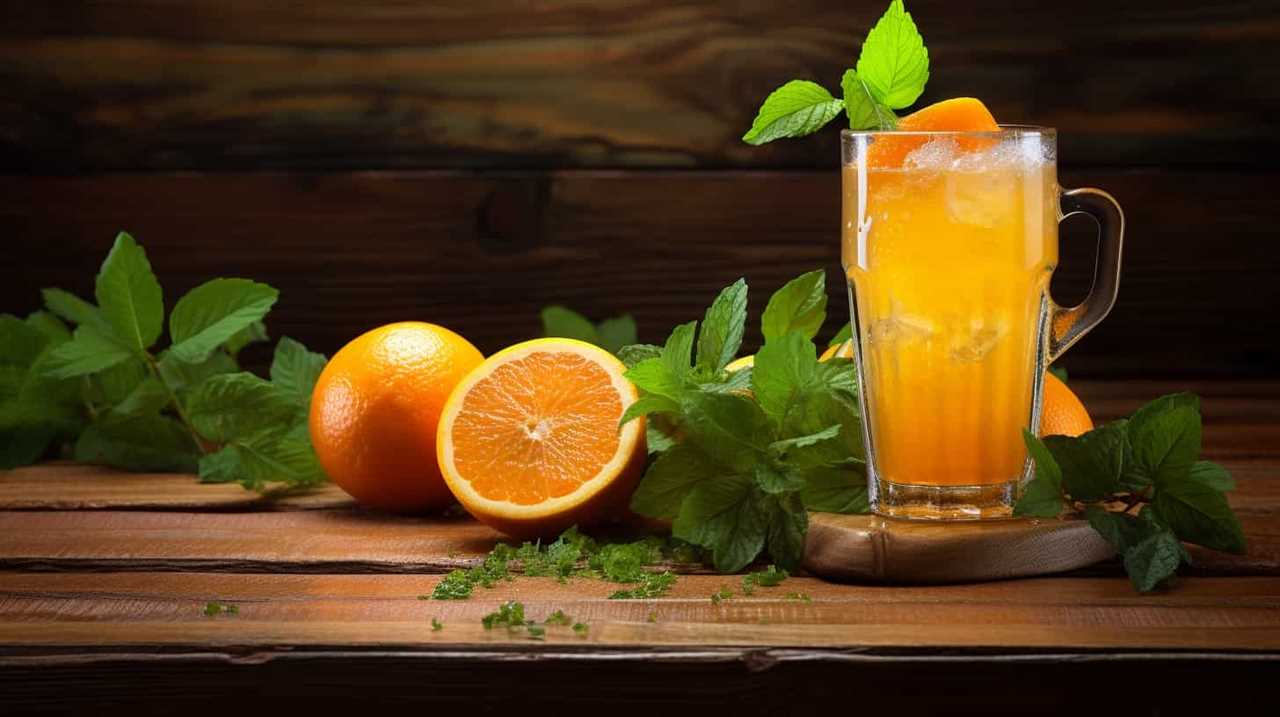
Frequently Asked Questions
Can I Use Store-Bought Aloe Vera Gel Instead of Fresh Aloe Vera for Making Juice?
Yes, you can use store-bought aloe vera gel instead of fresh aloe vera for making juice. However, it’s important to note that fresh aloe vera juice may have more health benefits due to its higher nutrient content.
How Long Can I Store Aloe Vera Juice in the Refrigerator?
Aloe vera juice can be stored in the refrigerator for up to a week. Refrigeration helps maintain the longevity and freshness of the juice, preserving its beneficial properties. It’s important to store the juice in an airtight container to prevent contamination and maintain its quality. Similarly, you might wonder *how long ginger juice lasts*; typically, fresh ginger juice can be refrigerated for about 1–2 weeks as well. Both aloe vera and ginger juices are best consumed within their shelf life to ensure maximum potency and health benefits. Additionally, freezing either juice can extend their shelf life, though some loss of nutrients and potency may occur during the process. When thinking about *how long fresh juice lasts*, it’s crucial to check for signs of spoilage, such as changes in smell, taste, or color, before consuming. To enjoy the best results, it’s always recommended to use fresh ingredients and properly store the juice to ensure you’re getting the most out of its health benefits.
Can Aloe Vera Juice Help With Digestive Issues?
Aloe vera juice can potentially help with digestive issues when taken in appropriate dosages. However, it is important to note that there may be potential side effects. It is always best to consult with a healthcare professional before starting any new supplement regimen.
Can I Use Artificial Sweeteners Instead of Natural Sweeteners in My Aloe Vera Juice?
Using artificial sweeteners in aloe vera juice may affect its taste and potential health benefits. However, natural sweeteners like honey or stevia can enhance the flavor without compromising its nutritional value.

Is It Safe to Drink Aloe Vera Juice Every Day?
Drinking aloe vera juice daily can have numerous benefits, such as improving digestion and boosting the immune system. However, consuming it regularly may also lead to potential side effects like diarrhea or stomach cramps.
Conclusion
In conclusion, making aloe vera juice taste better is easy and enjoyable.
By choosing the right aloe vera juice and adding natural sweeteners, infusing with fruits and herbs, blending with other juices, and experimenting with flavor combinations, you can create a delightful and refreshing drink.
So go ahead and unleash your creativity in the kitchen, and transform your aloe vera juice into a sensational elixir that will transport your taste buds to paradise.
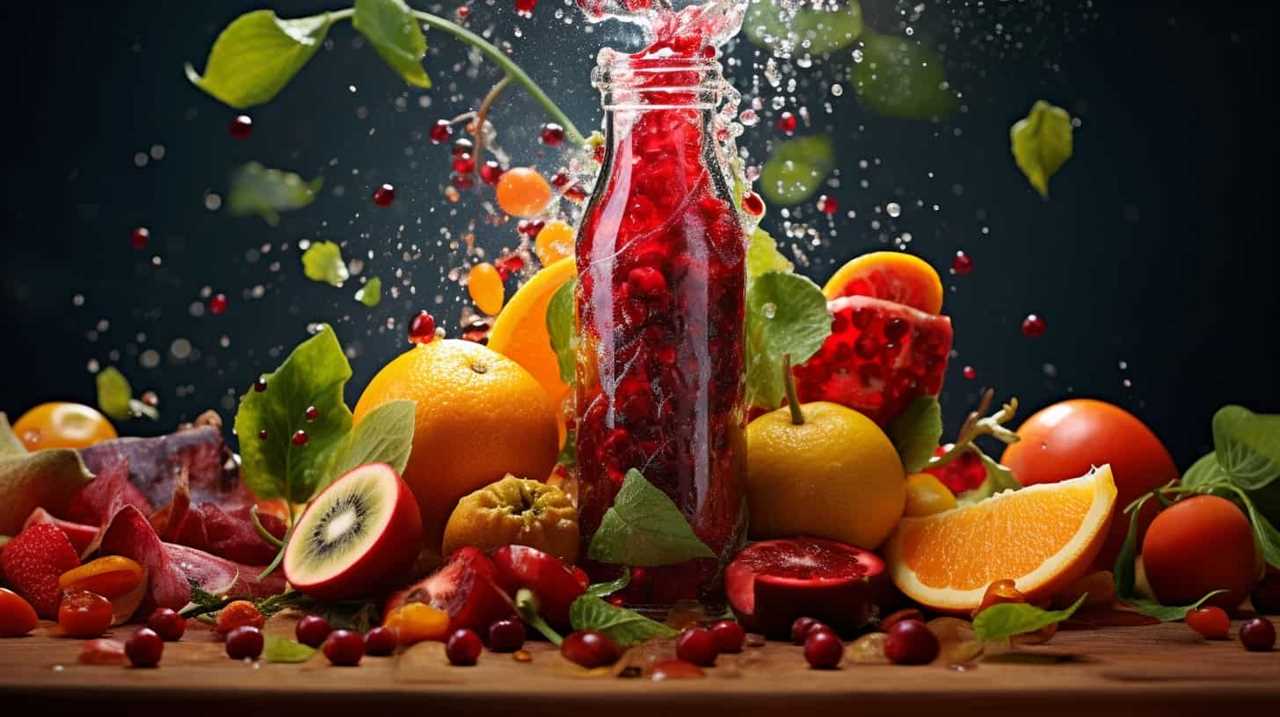
Susannah expertise lies in researching and compiling evidence-based content on juicing, nutrition, and overall health. She is committed to ensuring that The Juicery World offers accurate, up-to-date, and trustworthy information to empower readers to take control of their health. Susannah’s goal is to inspire individuals to embrace juicing as a way to nourish their bodies and live their best lives.
Juice Tips and Tricks
How to Make a Glass of Lemonade With Bottled Lemon Juice

Are you craving a cool glass of lemonade to quench your thirst? Look no further! Try out our perfect recipe using bottled lemon juice that will surely please your taste buds.
In this article, we’ll guide you through the process of creating a tangy and sweet concoction that will leave you feeling refreshed and satisfied.
So grab your ingredients and let’s get started on this delightful journey of serving ourselves and others a glass of pure lemony goodness.
Key Takeaways
- Consider the storage of the bottled lemon juice (dark glass or plastic bottles, protect from light exposure, check expiration date)
- Choose a suitable pitcher and fresh lemons for enhanced flavor
- Store the lemonade concentrate in the refrigerator to maintain freshness
- Adjust the sweetness and tartness to taste with sugar or more lemon juice, and experiment with different sweeteners or additional flavors.
Choosing the Right Bottled Lemon Juice
What are the key factors we should consider when selecting the right bottled lemon juice for our lemonade?

One important factor is how the lemon juice is stored. Look for bottles that are made of dark glass or plastic, as they help protect the juice from light exposure, which can degrade its quality. It’s also important to check the expiration date to ensure freshness.
Another benefit of using bottled lemon juice is convenience. It saves time and effort compared to squeezing fresh lemons. Additionally, bottled lemon juice provides consistent flavor, as the acidity levels are standardized.
When selecting a brand, consider reading reviews and checking for certifications, such as organic or non-GMO.
Gathering the Necessary Ingredients and Tools
How can we gather all the necessary ingredients and tools to make a glass of lemonade with bottled lemon juice? First, we’ll need to collect bottled lemon juice, sugar, and cold water, as well as a pitcher and a spoon for mixing. If you prefer extra flavor, you can also gather ice and optional add-ins like mint or soda water. While preparing the lemonade, it’s easy to understand why some people wonder about other citrus drinks and may ask, “how many oranges per gallon” are needed when making orange juice instead. Once everything is assembled, combine the lemon juice, sugar, and water in the pitcher, stirring until the sugar dissolves. Feel free to adjust the sweetness or tartness to your liking, and don’t forget to add ice or any optional add-ins for an extra refreshing touch. This process might even make you curious about how much juice from oranges is needed when making fresh orange juice compared to using bottled citrus products. Once your lemonade is ready, pour it into a glass and enjoy the refreshing taste. This simple recipe can inspire you to try other homemade juices, such as learning **how to make pear juice** or experimenting with other fruit combinations. Whether you’re using fresh fruits or bottled options, creating your own beverages is a fun and rewarding way to personalize your drinks.
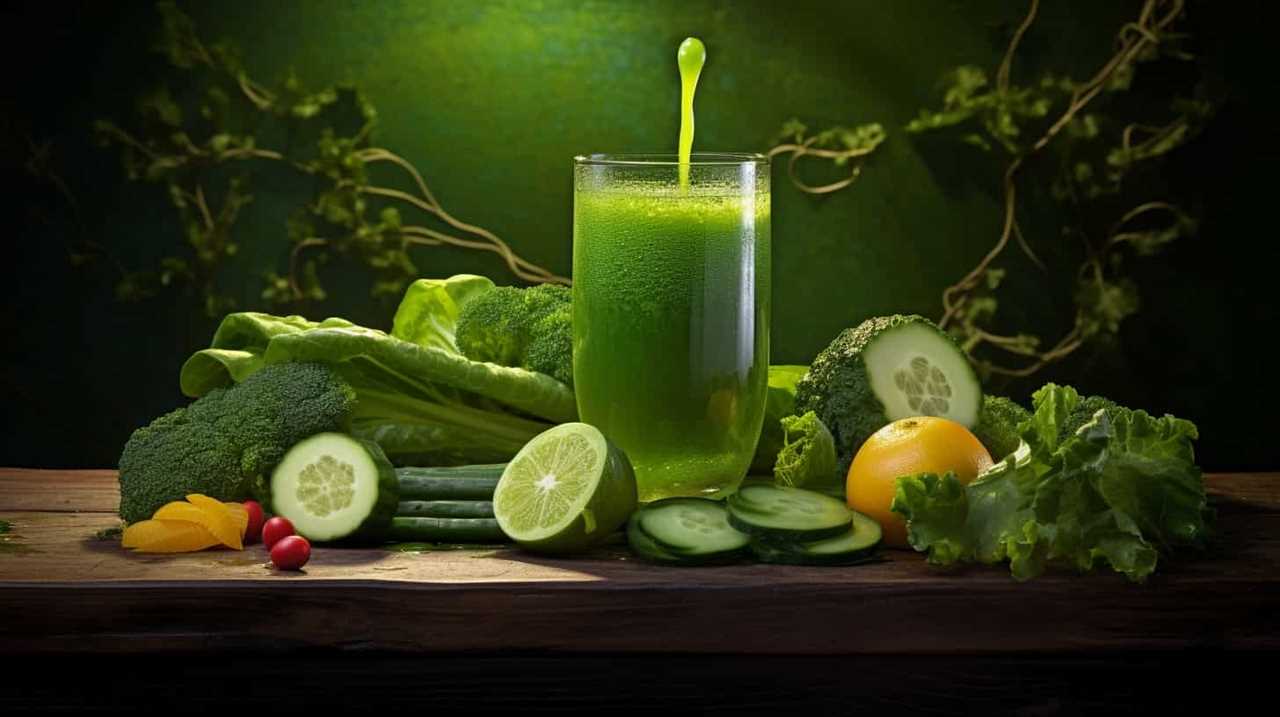
It’s important to start with the right pitcher. Look for a pitcher that’s made of glass or BPA-free plastic, as these materials won’t affect the taste of the lemonade. The pitcher should also have a lid or cover to keep the lemonade fresh and prevent spills.
Now, let’s talk about the lemons. While bottled lemon juice is convenient, using fresh lemons instead can elevate the flavor of your lemonade. Choose lemons that are firm and have a bright yellow color. Give them a gentle squeeze to ensure they’re juicy. To extract the juice, you’ll need a citrus juicer or a reamer. These tools make it easy to get every last drop of juice from the lemons.
Mixing the Lemonade Concentrate
To start mixing the lemonade concentrate, we’ll slowly pour the bottled lemon juice into the pitcher. It’s important to choose the right container for the lemonade concentrate. A pitcher with a lid or a tightly sealed container will help maintain the freshness and prevent any spills or leaks. Once the lemon juice is in the pitcher, we can move on to the next step of adding water and sweetener.
To ensure the lemonade concentrate stays fresh, it’s essential to store it properly. Keep the pitcher in the refrigerator to maintain its cool temperature and prevent any bacteria growth. If you have any leftover concentrate, transfer it to a smaller container with an airtight lid before refrigerating. This will help retain its flavor and prevent any contamination.

Now that we’ve mixed the lemonade concentrate, it’s time to adjust the sweetness and tartness to taste.
Adjusting the Sweetness and Tartness to Taste
We can adjust the sweetness and tartness of the lemonade to taste by adding more sugar or lemon juice, respectively. If you prefer a sweeter lemonade, simply add more sugar and stir until it dissolves completely. You can experiment with different sweeteners such as honey or agave syrup to find the perfect balance of sweetness.
On the other hand, if you want a tangier lemonade, add more lemon juice gradually, tasting as you go until it reaches your desired level of tartness.
Additionally, you can get creative with your lemonade by adding flavors like fresh mint leaves or a hint of lavender. These additions can elevate the flavor profile and create a more refreshing and unique experience.

Now that we’ve adjusted the sweetness and tartness of our lemonade, let’s move on to serving and enjoying your refreshing glass of lemonade.
Serving and Enjoying Your Refreshing Glass of Lemonade
Now let’s sit back, relax, and savor our refreshing glass of lemonade.
When it comes to serving and enjoying this delightful drink, there are a few techniques and garnishing options to consider.
Firstly, serving your lemonade chilled is essential for maximum enjoyment. Ensure that you have chilled glasses or add ice cubes to the glasses before pouring the lemonade.

To add a touch of elegance, you can garnish your lemonade with a slice of lemon on the rim of the glass. For an extra burst of flavor, you could also add a sprig of fresh mint or a few berries.
Remember to gently stir the lemonade before serving to evenly distribute the flavors.
Now, take a sip, feel the refreshing tang of lemon, and let the sweet and tart flavors dance on your taste buds.
Cheers!
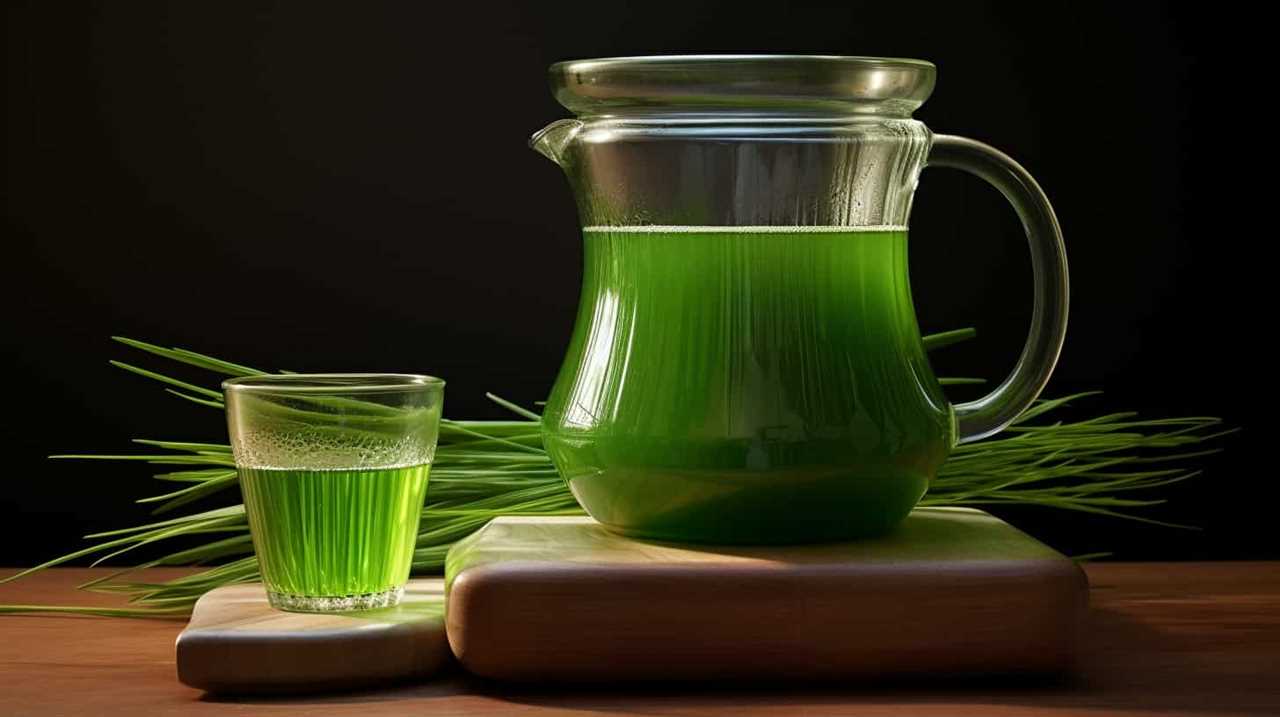
Frequently Asked Questions
Can I Use Fresh Lemons Instead of Bottled Lemon Juice?
Fresh lemons offer numerous benefits over bottled lemon juice. The taste of fresh lemons is unparalleled, providing a vibrant and tangy flavor. Incorporating fresh lemons into your lemonade will elevate its taste and give it a refreshing and authentic twist.
Can I Substitute Sugar With a Different Sweetener?
Substituting sweeteners in lemonade can enhance the flavor and offer health benefits. We’re knowledgeable about alternative sweeteners and can provide precise, detailed instructions on using them in place of sugar.
How Long Does the Lemonade Concentrate Need to Chill in the Refrigerator?
The chilling time for the lemonade concentrate in the refrigerator is typically around 1-2 hours. Using bottled lemon juice offers the benefit of convenience and consistent flavor for a refreshing glass of lemonade.
Can I Add Other Fruits or Flavors to the Lemonade?
Sure, we can definitely add different fruits or flavors to our lemonade. It’s a great way to experiment with unique flavors and create refreshing, personalized drinks. The possibilities are endless!

How Long Does the Lemonade Stay Fresh in the Refrigerator?
Lemonade made with bottled lemon juice can stay fresh in the refrigerator for about 5-7 days. To maximize shelf life, store it in an airtight container and keep it chilled.
Conclusion
And so, with a few simple steps and the right ingredients, a glass of refreshing lemonade is born.
Like a symphony of flavors dancing on your taste buds, this tangy elixir quenches thirst and brings joy on a hot summer day.
Just a sip transports you to a world of citrusy delight, where the sweetness and tartness blend harmoniously.

So go ahead, indulge in the art of lemonade-making and savor every drop of this sun-kissed nectar.
Cheers to the perfect glass of lemonade!
Susannah expertise lies in researching and compiling evidence-based content on juicing, nutrition, and overall health. She is committed to ensuring that The Juicery World offers accurate, up-to-date, and trustworthy information to empower readers to take control of their health. Susannah’s goal is to inspire individuals to embrace juicing as a way to nourish their bodies and live their best lives.
Juice Tips and Tricks
How to Know if Orange Juice Is Bad

We’ve all been in that situation before – reaching for a glass of orange juice and hesitating, unsure if it’s still okay to drink. Fear not! This article will give you the knowledge you need to determine for sure if your orange juice is still fresh or if it’s gone bad.
With a blend of scientific precision and practical tips, we’ll explore color changes, strange smells, off taste, texture changes, and mold or growth that may indicate spoilage.
Let’s dive in and serve ourselves a refreshing glass of certainty!
Key Takeaways
- Color changes in orange juice can indicate a loss of freshness and shelf life extension, but it doesn’t necessarily mean the juice is bad.
- Unusual or off-putting odors in orange juice, such as sour or fermented scents, can be a sign of poor quality.
- An off taste in orange juice, such as sour, bitter, or fermented flavors, suggests that the juice is spoiled.
- Texture changes in orange juice, such as pulp separation or a thicker consistency, can occur as the juice ages, so it’s important to consume it before the expiration date.
Color Changes in Orange Juice
We should be aware that color changes can indicate whether orange juice is bad.

When it comes to orange juice, color is a crucial factor to consider. As oranges are exposed to air, an oxidation process occurs, which leads to changes in color. Fresh orange juice has a vibrant orange hue, indicating its freshness and high nutritional value.
However, as time passes, the juice may undergo a color change, turning dull or brownish. This change in color is a result of the oxidation process, which affects the flavor and quality of the juice. It’s important to note that while a change in color doesn’t necessarily mean the juice is bad, it does indicate that the juice is losing its freshness and shelf life extension.
Therefore, it’s advisable to consume orange juice when it’s at its freshest, as indicated by its vibrant orange color.
Strange Smells in Orange Juice
When it comes to evaluating orange juice, we should be cautious of any strange smells or odors. A fresh, pleasant smell is indicative of good quality orange juice. However, if you notice any unusual or off-putting odors, it may be a sign that the juice has gone bad. These smells can range from a sour or fermented scent to a rancid or moldy aroma.

It’s important to note that while some natural variations in scent can occur due to the specific variety of oranges used, any strong or unpleasant smells should raise concerns. If you have citrus fruit allergies, it’s especially important to pay attention to the smell of orange juice, as it could indicate the presence of spoilage or contamination.
Ensuring the quality of orange juice is essential as it’s a popular beverage known for its health benefits, including being rich in vitamin C and antioxidants.
Off Taste of Orange Juice
Our taste buds can detect even the slightest hint of an off taste in orange juice, which can indicate that it has gone bad. The taste of orange juice should be fresh, tangy, and slightly sweet. If it tastes sour, bitter, or fermented, it’s likely spoiled.
One common cause of an off taste in orange juice is the use of overripe oranges. When oranges become overripe, their flavor profile changes, resulting in a less pleasant taste. Another factor to consider is the expiration date. Orange juice that has passed its expiration date is more likely to develop an off taste. It’s important to check the expiration date before consuming orange juice to ensure its freshness and quality. Additionally, improper storage conditions, such as leaving the juice at room temperature for extended periods, can lead to the development of unpleasant flavors. Storing orange juice in the refrigerator helps maintain its freshness for longer. For those exploring different juice options, aloe vera juice flavor tips suggest pairing tart juices with milder flavors to balance the overall taste.
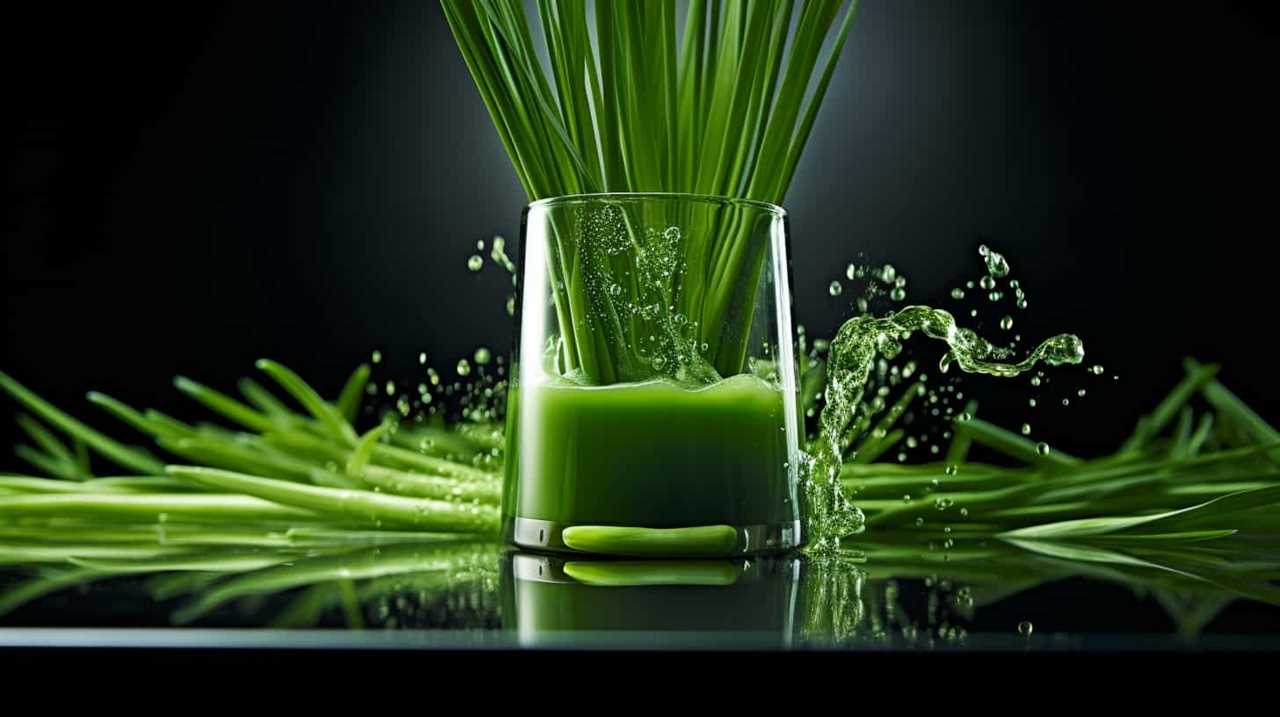
Now, let’s move on to discuss the texture changes in orange juice.
Texture Changes in Orange Juice
As we explore the texture changes in orange juice, it’s important to note that certain factors can cause it to become thicker or develop sediment. One common texture change in orange juice is pulp separation, where the pulp separates from the liquid and settles at the bottom. This can occur naturally over time, as the pulp particles become denser and sink.
Another factor that can affect the texture of orange juice is the expiration date. As orange juice ages, it may start to develop a thicker consistency and even form sediment. This is a result of the natural breakdown of the juice’s components. Therefore, it’s crucial to check the expiration date on orange juice and consume it before it reaches its expiration date to avoid any undesirable texture changes.
Mold or Growth in Orange Juice
We need to be aware of the possibility of mold or other growth occurring in orange juice. Mold can develop in orange juice if it isn’t stored properly or if it has passed its expiration date.
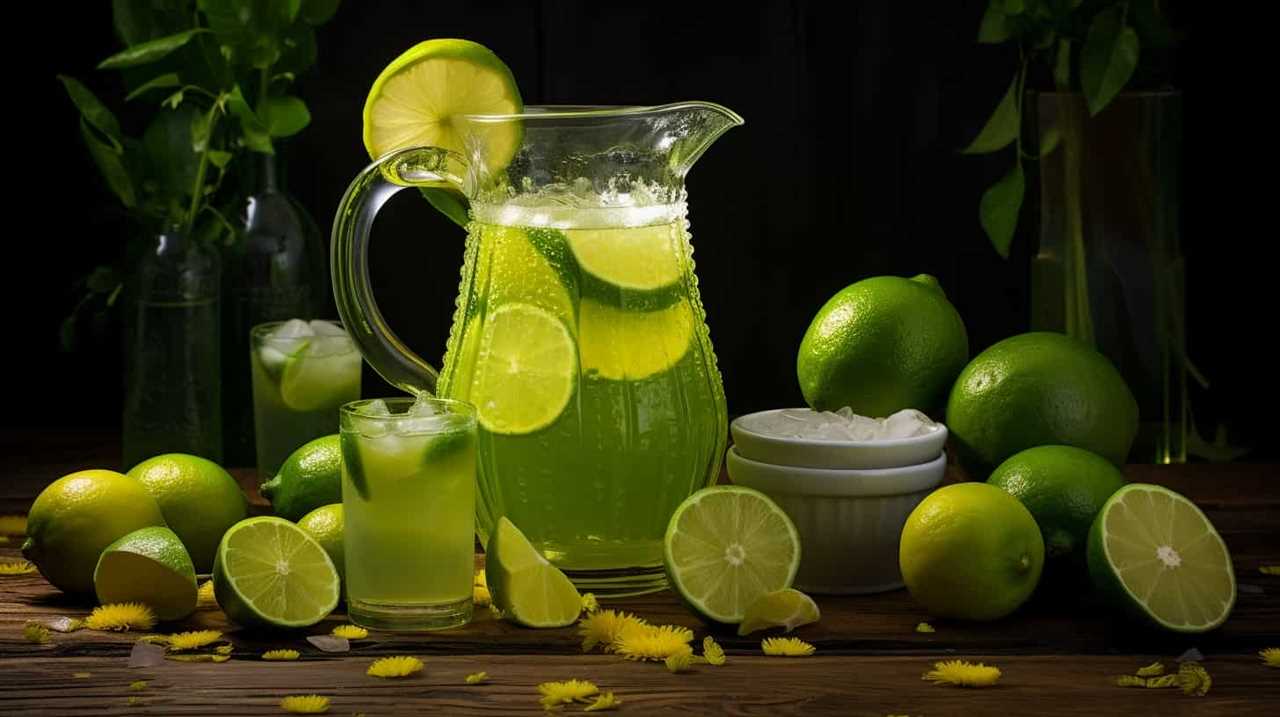
To prevent mold growth, it’s important to follow these steps:
- Store orange juice in the refrigerator at a temperature below 40°F (4°C).
- Check the expiration date on the bottle before consuming. Discard any orange juice that has expired.
- Keep the container tightly sealed to prevent air and moisture from entering, as these can promote mold growth.
Regularly inspecting orange juice for any signs of mold or unusual growth is essential. If you notice any discoloration, a strange odor, or visible mold, it’s best to discard the juice to avoid any potential health risks.
Frequently Asked Questions
Can Orange Juice Go Bad if It’s Stored in the Freezer for Too Long?
Frozen orange juice can potentially lose its nutrients and change its taste if stored in the freezer for too long. It is important to check for signs of spoilage before consuming it.
How Long Can Orange Juice Stay Fresh in the Refrigerator Once It’s Opened?
Once opened, orange juice can stay fresh in the refrigerator for about 7-10 days. To maintain its freshness, store it properly by keeping it tightly sealed and at a consistently cold temperature. If the orange juice develops an off odor, flavor, or appearance, it’s best to discard it to avoid any potential health risks. Factors like exposure to air and varying temperatures can influence how long orange juice lasts, so it’s crucial to handle it with care. Always check the expiration date as a general guide, but remember that proper storage can extend its freshness slightly. Additionally, avoid leaving the orange juice out at room temperature for extended periods, as this can significantly shorten how long orange juice lasts. Freezing the juice can be another option to extend its shelf life, but be aware that this may alter its texture and taste once thawed. By following these precautions, you can ensure your orange juice stays fresh and safe to consume.
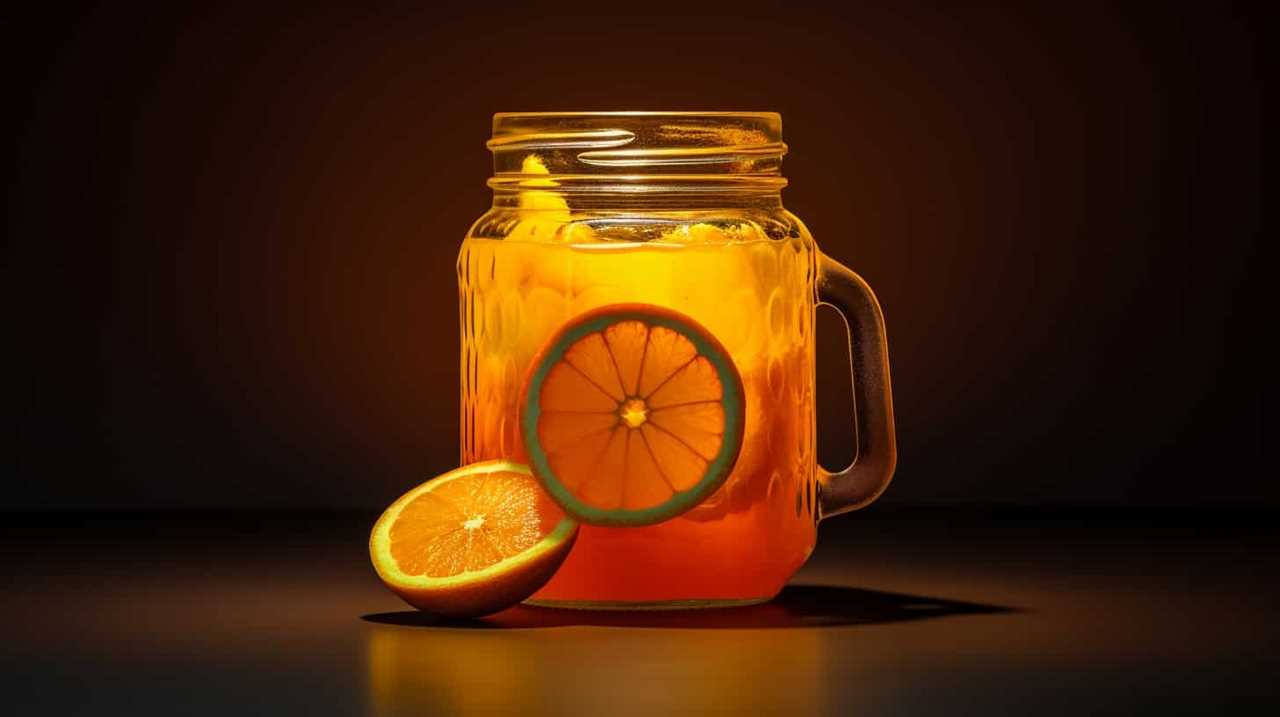
Is It Safe to Consume Orange Juice That Has Been Left Out at Room Temperature Overnight?
Left out orange juice may not be safe to drink as it can harbor harmful bacteria. Signs of spoiled orange juice include a sour smell, mold growth, and a change in color or taste.
Can Orange Juice Develop Harmful Bacteria if It’s Past Its Expiration Date but Still Looks and Smells Fine?
Orange juice can cause food poisoning if it develops harmful bacteria, even if it looks and smells fine. Signs of spoiled orange juice include a sour smell, mold growth, and a change in color or taste.
Does the Nutritional Value of Orange Juice Decrease as It Starts to Go Bad?
As orange juice goes bad, its nutritional value decreases. The longer it sits on the shelf, the more nutrients it loses. Signs of spoilage include a sour smell, off taste, and mold growth.
Conclusion
In conclusion, determining if orange juice is bad requires careful observation of color changes, strange smells, off taste, and texture changes. Just like a detective investigating a case, we must rely on our senses to detect any signs of spoilage.
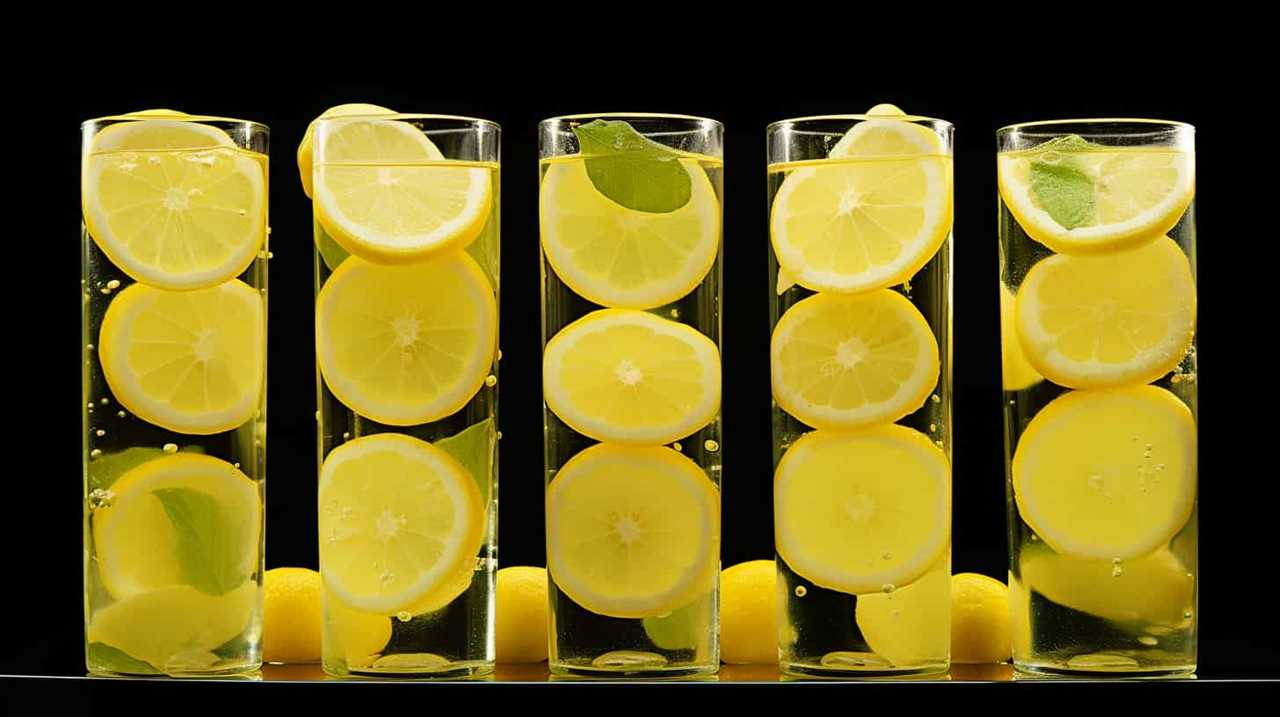
If we detect mold or growth in the orange juice, it’s a clear indication that it’s no longer safe to consume. By remaining vigilant and attuned to these indicators, we can ensure that our orange juice is always fresh and enjoyable.
Susannah expertise lies in researching and compiling evidence-based content on juicing, nutrition, and overall health. She is committed to ensuring that The Juicery World offers accurate, up-to-date, and trustworthy information to empower readers to take control of their health. Susannah’s goal is to inspire individuals to embrace juicing as a way to nourish their bodies and live their best lives.
-

 Vetted2 months ago
Vetted2 months ago15 Best Juices for Diabetics: Refreshing Options That Won’t Spike Your Blood Sugar
-

 Vetted2 months ago
Vetted2 months ago15 Best Decaf Coffee Options for Flavor Lovers Who Need a Caffeine Break
-

 Vetted2 months ago
Vetted2 months ago15 Best Espresso Ground Coffees to Elevate Your Morning Brew
-

 Vetted2 months ago
Vetted2 months ago15 Best K-Cup Coffee Pods for a Perfect Brew Every Time
-

 Vetted2 months ago
Vetted2 months ago15 Best Beans for Espresso: A Guide to Perfecting Your Brew
-

 Vetted2 months ago
Vetted2 months ago15 Best Kona Coffees to Savor the Rich Flavors of Hawaii
-

 Vetted2 months ago
Vetted2 months ago15 Best Cold Brew Coffees to Keep You Refreshed All Summer Long
-

 Vetted2 months ago
Vetted2 months ago15 Best Inexpensive Espresso Machines That Brew Quality Coffee on a Budget



